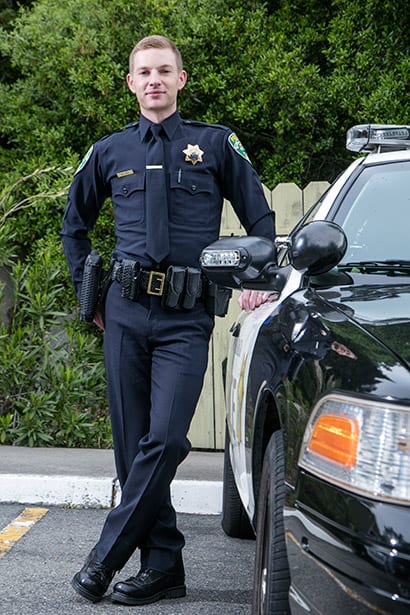
 KEVIN WALKER ’17
KEVIN WALKER ’17
He sees the furrowed brows, the blank stares, the befuddled expressions. Why, Kevin Walker ’17 is often asked, would someone with such a promising future risk his life, repeatedly, for free?
Walker, who became a reserve police officer while an undergrad at UCLA, recalls vividly the moment his life underwent a seismic shift.
“When I was in college, I tutored middle school kids in Los Angeles,” he says. “One lived in a high-crime neighborhood. I’d sometimes hear gunfire during our sessions, and one day his mom described how a gang had beaten her up—and how the cops who responded to the 9-1-1 call essentially saved her life. That sparked something in me.”
Walker went through police training and joined the LA County Sheriff’s Department. While reserve officers are unpaid, their duties mirror those of full-time cops—same hiring standards, equipment, and responsibilities.
“Reserve officers are doctors, teachers, people from all walks of life,” Walker says. “I worked alongside a Hollywood movie producer for a while.”
Just 21, Walker was assigned to some notorious areas of South Central LA.
“I was concerned,” says Kevin’s father, Richard Walker ’84. “The public’s trust in law enforcement was eroding. But Kevin did it for the right reasons—to help find common ground to divisions in our communities.”
Indeed, the chance to heal rifts and debunk stereotypes proved alluring.
“My co-workers were very attuned to the area’s history of tensions between officers and civilians,” Walker says. “Every car I pulled over, every person I talked to on the beat provided an opportunity to help reduce that tension and create better connections.”
While juggling school, Walker worked 800 hours during his first year of police work. When driving to LA became unsustainable in law school, he joined Moraga’s force.
Yes, he is fully aware of his passion’s peril. Last fall, he found himself in a harrowing, high-speed pursuit of an AK-47-wielding suspect.
“Everyone involved was fortunate not to get hurt,” he says. “The suspect ended up in custody and no shots were fired. Several hours later, I was in class learning how rules of evidence apply to criminal justice proceedings.”
Last year, Walker connected a Berkeley Law clinic and research center with his old LA department. They studied local law enforcement’s response to human trafficking in California, and a detailed report is scheduled for release this summer.
Walker worked at a Hong Kong arbitration center during the spring semester, and will practice corporate law at a San Francisco firm starting this fall. And, yes, his police work will continue.
“I call it community service on steroids,” he says. “For me, it’s a meaningful way to give back.”
—Andrew Cohen